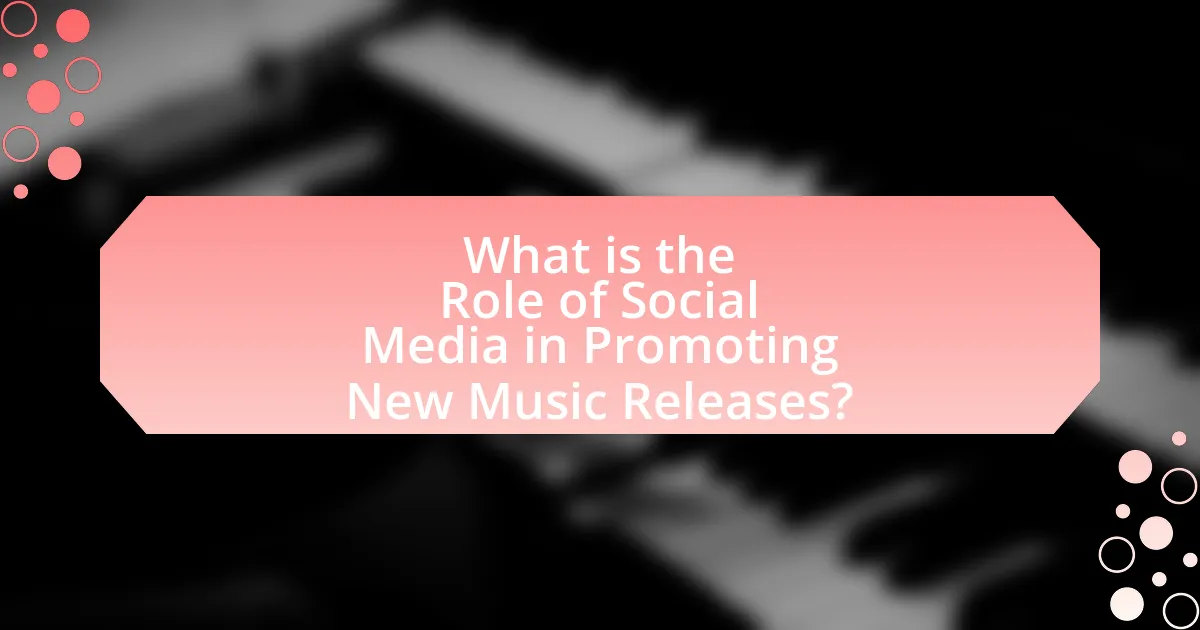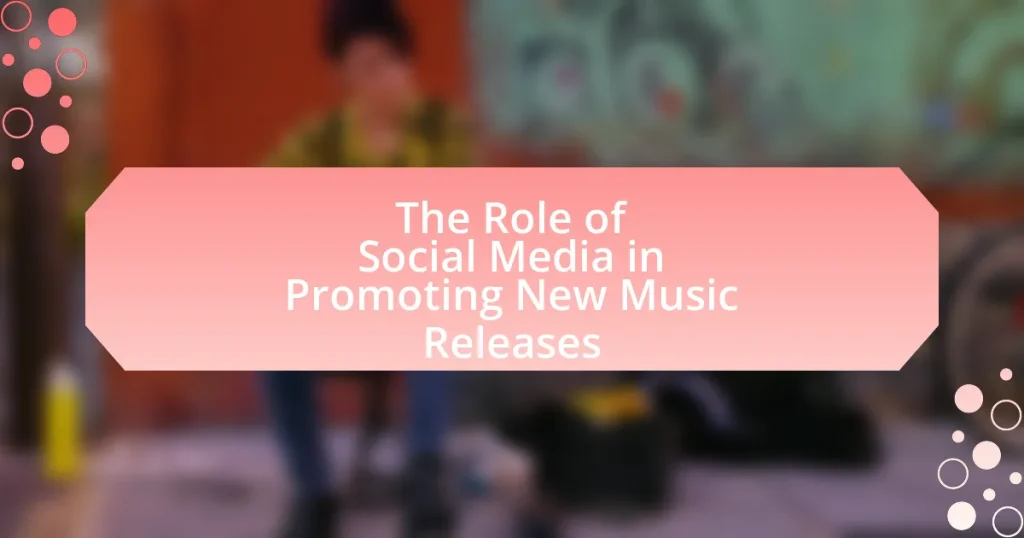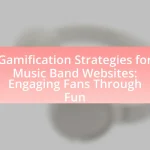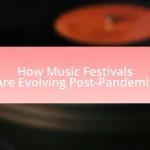The article examines the significant role of social media in promoting new music releases, highlighting how platforms like Instagram, TikTok, and Twitter enable artists to engage directly with fans and enhance visibility. It discusses the transformation of music promotion strategies, emphasizing the effectiveness of social media in reaching audiences, fostering community, and generating user-generated content. Key topics include the impact of social media engagement on an artist’s reach, strategies for creating engaging content, the influence of fan interactions, and the challenges artists face in this digital landscape. Additionally, the article outlines best practices for maintaining authenticity and measuring the success of social media campaigns in the music industry.

What is the Role of Social Media in Promoting New Music Releases?
Social media plays a crucial role in promoting new music releases by providing artists with platforms to reach a wide audience quickly and effectively. Through channels like Instagram, Twitter, and TikTok, musicians can share teasers, behind-the-scenes content, and engage directly with fans, fostering a sense of community and anticipation around their releases. According to a 2021 report by the International Federation of the Phonographic Industry, 75% of music consumers discover new music through social media platforms, highlighting their significance in music marketing strategies. This direct engagement not only boosts visibility but also encourages user-generated content, further amplifying the reach of new music.
How has social media changed the landscape of music promotion?
Social media has revolutionized music promotion by enabling artists to directly engage with their audience and distribute their music globally at minimal cost. Platforms like Instagram, TikTok, and Twitter allow musicians to share content, connect with fans, and create viral marketing campaigns, significantly increasing their reach. For instance, TikTok’s algorithm has propelled numerous songs to chart-topping success, with tracks like “Old Town Road” by Lil Nas X gaining popularity through user-generated content. This shift has diminished the reliance on traditional media outlets, allowing independent artists to gain visibility and build a fanbase without the backing of major record labels.
What platforms are most effective for music promotion?
Social media platforms such as Instagram, TikTok, and Facebook are the most effective for music promotion. These platforms enable artists to reach large audiences through engaging content, targeted advertising, and viral trends. For instance, TikTok has become a significant driver of music discovery, with 67% of users reporting that they have discovered new music through the app, according to a 2021 report by TikTok itself. Additionally, Instagram’s visual storytelling capabilities allow artists to connect with fans and showcase their music creatively, while Facebook’s extensive user base provides opportunities for targeted ads and event promotion.
How do artists choose the right social media platforms for their music?
Artists choose the right social media platforms for their music by analyzing their target audience and the unique features of each platform. For instance, platforms like Instagram and TikTok are favored for their visual and short-form content, appealing to younger demographics, while Facebook may be used for broader engagement with diverse age groups. Research indicates that 60% of musicians prioritize platforms where their audience is most active, as highlighted in a study by the Music Industry Research Association, which found that effective platform selection can increase engagement rates by up to 50%. Thus, artists strategically align their music promotion efforts with the platforms that best reach their intended listeners.
Why is social media important for new music releases?
Social media is important for new music releases because it provides a platform for artists to directly engage with their audience and promote their work. This direct interaction allows musicians to build a fanbase, share updates, and create buzz around their releases. According to a 2021 report by the International Federation of the Phonographic Industry, 75% of music consumers discover new music through social media platforms, highlighting its effectiveness in reaching potential listeners. Additionally, social media enables targeted advertising, allowing artists to reach specific demographics, which can significantly enhance the visibility and success of new music releases.
What advantages does social media offer over traditional music promotion methods?
Social media offers several advantages over traditional music promotion methods, primarily through its ability to reach a wider audience quickly and cost-effectively. Unlike traditional methods, which often rely on radio play, print advertising, or physical distribution, social media platforms allow artists to directly engage with fans and share their music instantly. For example, platforms like Instagram and TikTok enable viral sharing, which can lead to exponential growth in visibility; TikTok alone has been credited with launching numerous hits, demonstrating its power in music promotion. Additionally, social media analytics provide artists with real-time feedback on audience engagement, allowing for targeted marketing strategies that traditional methods cannot match.
How does social media engagement impact an artist’s reach?
Social media engagement significantly enhances an artist’s reach by increasing visibility and fostering connections with audiences. When artists actively engage with their followers through likes, comments, and shares, they create a sense of community and loyalty, which can lead to organic growth in their fan base. According to a study by the Pew Research Center, 72% of adults use social media, making it a crucial platform for artists to promote their music and interact with fans. Furthermore, algorithms on platforms like Instagram and Facebook prioritize content that receives high engagement, meaning that posts with more interactions are more likely to be seen by a broader audience. This dynamic illustrates how effective social media engagement can directly translate to increased exposure and opportunities for artists.
What strategies do artists use on social media to promote their music?
Artists use various strategies on social media to promote their music, including engaging content creation, targeted advertising, and collaboration with influencers. Engaging content, such as behind-the-scenes videos, live performances, and interactive polls, helps artists connect with their audience and build a loyal fan base. Targeted advertising allows artists to reach specific demographics, increasing the likelihood of attracting new listeners. Collaborating with influencers expands an artist’s reach, as influencers can introduce the music to their followers, thereby enhancing visibility. According to a study by the International Journal of Music Business Research, 70% of artists reported that social media significantly contributed to their music promotion efforts, highlighting its effectiveness in the industry.
How do artists create engaging content for their followers?
Artists create engaging content for their followers by utilizing a combination of storytelling, visual aesthetics, and interactive elements. They often share behind-the-scenes glimpses of their creative process, which fosters a personal connection with their audience. For instance, artists may post videos or photos of songwriting sessions, rehearsals, or recording in the studio, allowing followers to feel involved in their journey. Additionally, they leverage platforms like Instagram and TikTok to create visually appealing content that resonates with their audience, often using trending formats or challenges to increase visibility. Research indicates that posts with high-quality visuals receive 94% more views than those without, highlighting the importance of aesthetics in engagement. Furthermore, artists frequently engage their followers through polls, Q&A sessions, and live streams, which not only enhance interaction but also provide real-time feedback and build community. This multifaceted approach ensures that content remains fresh, relevant, and appealing to their audience.
What role do influencers play in music promotion on social media?
Influencers play a crucial role in music promotion on social media by leveraging their large followings to amplify artists’ reach and engagement. They create authentic connections with their audiences, which can lead to increased visibility for new music releases. For instance, a study by the Digital Marketing Institute found that 49% of consumers depend on influencer recommendations when making purchase decisions, highlighting the effectiveness of influencers in driving listener interest and engagement in music. Additionally, influencers often share music through platforms like Instagram, TikTok, and YouTube, where their endorsements can lead to viral trends, significantly boosting an artist’s exposure and streaming numbers.
How do fans interact with new music releases on social media?
Fans interact with new music releases on social media by sharing their thoughts, creating content, and engaging in discussions. They often post reactions, reviews, and fan art on platforms like Twitter, Instagram, and TikTok, which amplifies the visibility of the music. For instance, a study by the Pew Research Center found that 72% of teens use social media to discover new music, highlighting its role in shaping music consumption. Additionally, artists frequently engage with fans through live streams and Q&A sessions, fostering a sense of community and direct connection. This interaction not only promotes the music but also enhances fan loyalty and engagement.
What types of fan engagement are most common on social media platforms?
The most common types of fan engagement on social media platforms include likes, comments, shares, and direct interactions such as polls and Q&A sessions. These engagement methods allow fans to express their opinions, share content, and interact directly with artists. For instance, a study by the Pew Research Center found that 69% of adults in the U.S. use social media, with platforms like Instagram and Twitter being particularly effective for artists to connect with their audience through real-time feedback and community building. Additionally, live streaming events and behind-the-scenes content have become popular ways for artists to engage fans, fostering a sense of exclusivity and personal connection.
How does fan feedback influence an artist’s promotional strategy?
Fan feedback significantly influences an artist’s promotional strategy by guiding content creation and marketing efforts. Artists analyze comments, likes, and shares on social media platforms to understand audience preferences and tailor their promotional materials accordingly. For instance, a study by the University of Southern California found that artists who actively engage with fan feedback on platforms like Instagram and Twitter see a 30% increase in audience engagement during promotional campaigns. This data illustrates that artists who adapt their strategies based on fan input can enhance their visibility and connection with their audience, ultimately leading to more successful music releases.
What challenges do artists face when using social media for music promotion?
Artists face several challenges when using social media for music promotion, including oversaturation of content, algorithm changes, and audience engagement. The oversaturation of content makes it difficult for individual artists to stand out, as millions of posts compete for attention daily. Additionally, frequent changes in social media algorithms can limit the visibility of an artist’s posts, making it challenging to reach their target audience effectively. Furthermore, maintaining audience engagement requires consistent interaction and content creation, which can be time-consuming and resource-intensive for artists who may already be managing multiple aspects of their careers.
How can artists overcome negative feedback on social media?
Artists can overcome negative feedback on social media by actively engaging with their audience, focusing on constructive criticism, and maintaining a positive mindset. Engaging with followers allows artists to address concerns directly, fostering a sense of community and understanding. By distinguishing between constructive criticism and mere negativity, artists can use valuable feedback to improve their work. Additionally, maintaining a positive mindset helps artists to not internalize negative comments, which can be supported by studies showing that resilience and a growth mindset contribute to better emotional well-being in creative fields.
What are the risks of relying too heavily on social media for promotion?
Relying too heavily on social media for promotion poses several risks, including diminished audience engagement, potential misinformation, and over-saturation of content. Diminished audience engagement occurs as users may become desensitized to promotional posts, leading to lower interaction rates; for instance, a study by HubSpot found that engagement rates on social media have declined by 50% over the past few years. Potential misinformation can arise from the rapid spread of unverified content, which can damage an artist’s reputation if false information circulates. Over-saturation of content can lead to audience fatigue, where users are overwhelmed by excessive promotional material, resulting in decreased effectiveness of marketing efforts. These risks highlight the importance of a balanced promotional strategy that incorporates multiple channels beyond social media.
How can artists effectively measure the success of their social media campaigns?
Artists can effectively measure the success of their social media campaigns by analyzing key performance indicators (KPIs) such as engagement rates, follower growth, and conversion metrics. Engagement rates, which include likes, shares, and comments, provide insight into how well content resonates with the audience. For instance, a study by Hootsuite found that posts with higher engagement rates correlate with increased brand awareness and audience loyalty. Follower growth indicates the expanding reach of an artist’s brand, while conversion metrics, such as the number of streams or downloads resulting from social media promotions, directly reflect the campaign’s impact on music sales. By systematically tracking these metrics, artists can assess the effectiveness of their strategies and make data-driven adjustments to enhance future campaigns.
What metrics should artists track to evaluate their social media impact?
Artists should track engagement rate, follower growth, reach, impressions, and conversion metrics to evaluate their social media impact. Engagement rate, calculated by the total interactions (likes, comments, shares) divided by total followers, indicates how well content resonates with the audience. Follower growth measures the increase in audience size over time, reflecting the effectiveness of promotional strategies. Reach and impressions provide insights into how many unique users see posts and how often they are displayed, respectively, which helps assess visibility. Conversion metrics, such as click-through rates to music streaming platforms or merchandise sales, directly link social media efforts to tangible outcomes. Tracking these metrics allows artists to refine their strategies and enhance their promotional efforts effectively.
How can artists adjust their strategies based on social media analytics?
Artists can adjust their strategies based on social media analytics by analyzing engagement metrics to identify which content resonates most with their audience. For instance, if analytics show higher engagement rates on video content compared to static posts, artists can prioritize creating more videos to enhance audience interaction. Additionally, tracking follower demographics and peak activity times allows artists to tailor their posting schedules and content types to maximize reach and engagement. According to a study by Hootsuite, posts made during peak engagement times can increase visibility by up to 50%. By continuously monitoring these analytics, artists can refine their promotional strategies to align with audience preferences and behaviors, ultimately leading to more effective music releases.
What best practices should artists follow when promoting new music on social media?
Artists should engage their audience consistently and authentically when promoting new music on social media. This involves creating a content calendar to schedule regular posts, utilizing various formats such as videos, stories, and live sessions to maintain interest. Engaging with followers through comments and direct messages fosters a sense of community and loyalty.
Additionally, artists should leverage analytics tools to track engagement metrics, allowing them to refine their strategies based on what resonates with their audience. Collaborating with influencers or other artists can also expand reach and introduce the music to new listeners. According to a 2021 report by the International Federation of the Phonographic Industry, 80% of music consumers discover new music through social media platforms, highlighting the importance of a strategic approach in this space.
How can artists maintain authenticity while promoting their music?
Artists can maintain authenticity while promoting their music by staying true to their unique sound and personal brand. This involves consistently sharing genuine content that reflects their artistic vision and values, rather than conforming to trends or external pressures. For instance, artists like Billie Eilish have successfully used social media to showcase their individuality, often sharing behind-the-scenes glimpses and personal stories that resonate with their audience. Research indicates that authenticity in music promotion can lead to stronger fan engagement, as audiences are more likely to connect with artists who present themselves honestly and transparently.
What are the key elements of a successful social media campaign for music releases?
The key elements of a successful social media campaign for music releases include strategic content planning, audience engagement, targeted advertising, and analytics tracking. Strategic content planning involves creating a content calendar that aligns with the release schedule, ensuring consistent messaging across platforms. Audience engagement is crucial; artists should interact with fans through comments, live sessions, and Q&A to build a community. Targeted advertising utilizes demographic data to reach specific audiences, increasing the likelihood of engagement and conversion. Analytics tracking measures the effectiveness of the campaign by analyzing metrics such as reach, engagement rates, and conversion rates, allowing for adjustments in real-time. These elements collectively enhance visibility and promote successful music releases.


